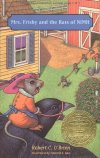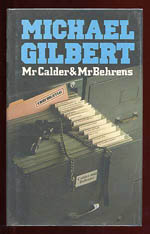 Well, I'm going in to this post forewarned by jarrett's comment in the last post. I'm very curious to hear why he was so dissapointed by Fatherland. I found it to be a well-written, thoroughly researched and entertaining historical (or faux future-historical) detective story. I'd go so far as to say that the ending actually had some emotional impact.
Well, I'm going in to this post forewarned by jarrett's comment in the last post. I'm very curious to hear why he was so dissapointed by Fatherland. I found it to be a well-written, thoroughly researched and entertaining historical (or faux future-historical) detective story. I'd go so far as to say that the ending actually had some emotional impact.It's 1964 in an alternate past where the Nazis win the Second World War. The hero is a detective in the Berlin police force (and by default a member of the SS). He is divorced, his son hates him and he's having ambivalent feelings about the Fuhrer. He is called on to investigate a body found in a river bank. An old guy, missing a foot, but in decent shape. Of course, the investigation becomes complex and dangerous, potentially revealing conspiracies at the highest level. I'm not going to go into any of the details of they mystery, because that's what keeps it interesting, but I found it very well done, fitting nicely into the history that we know and being compelling and disturbing in and of itself.
I thought the book really captured that feeling of paranoia and self-censorship that a succesful nazi regime may well have put into place. Everybody has a file. If you're not in several party and social organizations, interest will be paid to you. Another interesting idea, a connection that I hadn't made, is the germans are constantly fighting a war against Russian and Communist partisans on the far eastern front. It's the "Total War" that Hitler postulated as a foundation of National Socialism. The partisans are called terrorists and terror attacks are a constant fear and fundamental part of the state security apparatus. This was written before 9/11 but sure sounds familiar.
A fun read and well thought out.
 This is the second book taking place in Herbert's Con-Sentiency world and a sequel of sorts to
This is the second book taking place in Herbert's Con-Sentiency world and a sequel of sorts to  What a fantastic book. I'd of course heard about the movie, but it was
What a fantastic book. I'd of course heard about the movie, but it was  This is at least the third time I've read this book. The first was at some point in my teenage years, working my way through my parents collection of Michael Gilbert paperbacks. When I moved to New York, I would pick up any of his paperbacks I found, building up my own collection and reading them. This was my mid-20s. Sadly, I am motivated to re-read at least one of Gilbert's books now in honor of his
This is at least the third time I've read this book. The first was at some point in my teenage years, working my way through my parents collection of Michael Gilbert paperbacks. When I moved to New York, I would pick up any of his paperbacks I found, building up my own collection and reading them. This was my mid-20s. Sadly, I am motivated to re-read at least one of Gilbert's books now in honor of his  Got a nice old paperback copy of this as a birthday gift. I've read Dune and quite enjoyed it but didn't have much of an overall understanding of Frank Herbert. Whipping Star started out like a classic of 60s sci-fi (silver age?), with a lone male character in a situation, using a language style very much from that period. However, quite quickly, it heads into a pretty bizarre metaphysical direction. It spends most of the time there. There is a plot about the end of all living creatures and it does come up with some narrative tension at the end, but really most of the book is about species trying to communicate with other species whose perspectives and existences are so different that they barely have a frame of reference to compare anything.
Got a nice old paperback copy of this as a birthday gift. I've read Dune and quite enjoyed it but didn't have much of an overall understanding of Frank Herbert. Whipping Star started out like a classic of 60s sci-fi (silver age?), with a lone male character in a situation, using a language style very much from that period. However, quite quickly, it heads into a pretty bizarre metaphysical direction. It spends most of the time there. There is a plot about the end of all living creatures and it does come up with some narrative tension at the end, but really most of the book is about species trying to communicate with other species whose perspectives and existences are so different that they barely have a frame of reference to compare anything.


